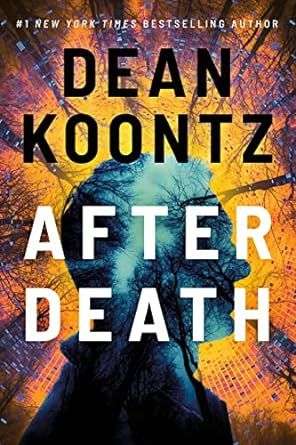We’ve implemented some new protocols around sending us messages via this website. Please email website “at” britishfantasysociety “dot” org for any issues.

For all things fantasy, horror, and speculative fiction
-
Announcement:

After Death
After Death by Dean Koontz
Thomas & Mercer, pb, £6.99
Reviewed by John Dodd

I’ve never read Dean Koontz before, and given the volume of work he’s put out there over the years, that always seemed like a massive oversight.
After Death begins with Michael Mace walking into the offices of a corrupt businessman where said businessman is standing in his pyjamas looking at a massive stack of money alongside two hitmen that are in his employ. Michael asks for money without threat of weapons and then walks out of the building with the money in a bag.
By the end of the book, this is the most normal thing that happens in it…
What we find out quickly is that Michael has recently returned from the dead, an experiment went wrong (or very right) and brought him back, but now suffused with nanites, he has the ability to instantly link to and control any computer system, no matter its level of encryption, and to leave without any trace of him ever being there.
Of course, this cannot be allowed to continue…
What follows is a chase of sorts, split into two different narratives linked by the thinnest of threads. In the first, Michael is trying to keep Nina and John, the people he loves, from being killed by Aleem, John’s father. In the second, Calaphas Durand is set on the path by the men that Michael robbed in the first act to find and kill Michael before the truth about him and his abilities becomes well known.
Except Michael has no interest in becoming well known, he has his motivations, and he has his needs, and he will do anything to ensure that he keeps Nina and John safe. What he wants is to live a life away from all the violence and nastiness so that he can enjoy his second go on the roundabout.
But that is not how it is to be…
It’s a slow burner, to begin with, with plenty of solid details that will become required at some point later in the plot, and Koontz doesn’t mind introducing many characters, only to kill them when they were just getting interesting, all of which leads to an inherent instability in the action, where you’re sure that certain characters are going to be bulletproof all the way to the end, but everyone else is fair game. The central premise that Michael can literally control the internet and all electrical systems is an interesting one, but it also means that there are several points where I found myself wondering why he didn’t just buy an island somewhere, new identities, erase all knowledge of his former self, and just vanish as only he could do.
Fear not, reader, Koontz addresses this in the end.
What we have here is a chase from start to finish; I never had concerns for the main character nor those he protected; he was beyond competent from start to finish, and while there were points where the narrative was stretched by the sudden epiphanies of gangsters, there was never a point where I thought that Michael wasn’t going to make it.
The real villain, Calaphas Durand, is interesting and complicated, described as a sociopath whilst definitely being something else entirely. His every action screams Villain, his words carefully chosen, his attire, his weapons; if he’d walked into every shot wearing a suit covered in the words “I’m the Bad Guy”, I would not have been surprised. But that just makes him all the more fun, and in the end, that’s what this novel is.
Fun.
From the beginning and the impossible premise to the chases to the UberVillain to the fricking remote control robodogs, every part of it is over-the-top thriller territory, and that makes it an excellent book. If you’re looking for something grounded and gritty, this is not the book you’re after, but if you’re after an enjoyable romp with colourful characters, you could do much worse than pick this one up.
Explore the blog:
Blog categories:
Latest Posts:
Tags:
#featured (56) #science fiction (25) Book Review (264) events (44) Fantasy (231) Graphic Novel (13) horror (136) Members (62) Orbit Books (48) profile (43) Romance (17) Science Fiction (50) short stories (28) Titan Books (52) TV Review (15)
All reviews
Latest Reviews:
- THE HOUSE ON THE BORDERLAND by William Hope Hodgson
- Monstrum by Lottie Mills
- Mood Swings by Dave Jeffery
- Yoke of Stars by R.B. Lemberg
- Hera by Jennifer Saint
- The Black Bird Oracle by Deborah Harkness
- RETURN OF THE DWARVES By Markus Heitz
- Delicious in Dungeon
- Toxxic by Jane Hennigan
- THIS ISLAND EARTH: 8 FEATURES FROM THE DRIVE-IN By Dale Bailey
Review tags:
#featured (2) Action (4) Adventure (4) Book Review (28) Fantasy (18) Featured (2) Feminist (2) Gothic Horror (3) Horror (14) Magic (3) Orbit Books (3) Romance (6) Science Fiction (5) Swords and Sorcery (2) Titan Books (7)